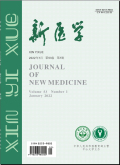新医学2024,Vol.55Issue(5):373-380,8.DOI:10.3969/j.issn.0253-9802.2024.05.009
精准医学领域肺纤维化的新兴治疗策略
Emerging treatment strategies for pulmonary fibrosis in precision medicine
摘要
Abstract
Pulmonary fibrosis(PF)is a chronic progressive lung disease that poses a serious health risk.It is mainly characterized by abnormal fibrosis and scarring of lung tissues,resulting in the gradual replacement of alveoli with fibrous tissues and ultimately respiratory failure,posing a serious threat to human health.To date,the treatment of PF has been a formidable challenge.However,in recent years,with the rise of precision medicine concepts and emerging therapies,the understanding and treatment strategies of PF have been ever advanced.This article provides a comprehensive review of recent research advances in PF within the field of precision medicine,from the perspectives of both molecular biology and genetics,as well as emerging therapeutic strategies,aiming to reveal the potential for tapping into emerging therapeutic strategies using molecular biological tools such as high-throughput bioinformatics technology and analysis.In-depth understanding of these advances can help to better elucidate the pathophysiological processes of PF and provide novel ideas and strategies for future clinical practice,thereby improving patients'clinical prognosis and quality of life.关键词
肺纤维化/精准医学/新兴治疗策略/分子生物学/遗传学Key words
Pulmonary fibrosis/Precision medicine/Emerging therapeutic strategy/Molecular biology/Genetics引用本文复制引用
夏冬,杨慧龄..精准医学领域肺纤维化的新兴治疗策略[J].新医学,2024,55(5):373-380,8.基金项目
国家自然科学基金(81272334) (81272334)
广东医科大学学科建设项目(4SG23008G) (4SG23008G)

